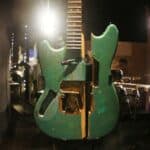Guitars are not popular because of their own merit.
If you pay enough attention, there’s always a guy holding that iconic instrument and making it sound in a way that moves you.
And although most of us agree that it’s the player and not the guitar that changes the industry with an iconic sound, we fans also can’t help falling in love with legendary instruments.
Think of John Mayer’s strats or EVH’s Frankenstrtat.
Those are guitars we all would love to have.
But can’t we have them?
Signature models are very popular nowadays, but many players are still wondering if they are really worth it.
Well here’s a short answer:
Signature guitar models are built to fulfill the favorite specs and particular desires of a certain player. It’s unlikely that you will share all of these preferences, however, in most cases, these guitars are of very high quality, and a great option for guitarists looking to come close to the signer’s tone.
In this article, I will try to tell you all there is about signature guitars, why they could be great for you, and what to look for before getting one.
After leaving this page you will have a clear idea about if a signature guitar could work for achieving what you have in mind with your playing.
Are you ready to get started?
Let’s go!
What is a signature guitar?
A signature guitar is an instrument built as a partnership between a certain guitar brand and a particular player who signs the model as its own.
These guitars are built down to every detail according to the player’s preference, and it’s very likely that there’s also a contract between the parties where the famous guitarist is compelled to promote the product.
This kind of partnership is very common nowadays, and although it can be seen as a cheap marketing ploy, in many cases it results in amazing instruments that many players love.
Are signature guitars better than the ones from regular lines?
Signature guitars are not necessarily better than the ones from regular lines, and for many players, they could be even worse.
Although signature instruments are, in most cases, based on models from the regular lines of a brand, they are further refined to the particular preferences of the player that brings his or her name into the equation.
This customization to another one’s taste could make it a worse instrument for you.
However, quality-wise, it’s true that, in many cases, signature guitars are built up to the highest standard of a brand, and sometimes you could be getting a great deal with them.
Why should you get a signature guitar?
You should get a signature guitar if you really like the music and playing style of the artist that lends its name to the model.
Getting a signature guitar would not necessarily mean that you are the biggest fan, but it should at least signify that you enjoy that kind of tone.
Another good reason to get a signature guitar is if you really like a brand, but the only instrument that really fits with your playstyle is a significant one.
Think for example of PRS.
If you really like their guitars, but you are an extreme metal player, most probably you would naturally gravitate towards their Tremonti models likely without being his biggest fan.
Or well, maybe without even knowing who he is.
Reasons to not get a signature guitar
Signature guitars are very specific in features to the taste of the player that inspired them.
These features might not resonate with you, or not work with your playing style.
Even though you are their biggest fan, your technique and sound might not be compatible with how their instrument is configured.
Hey, even your rig might be completely different and clash with their setup.
I can think of JEM guitars, Steve Vai’s Ibanez signature model having very high output pickups.
Pickups that work wonders with the rest of his rig, but maybe won’t be a match with yours.
Another big reason to pass from getting a signature guitar is probably price.
You see, in many cases, the extra demand that an artist provides for a certain instrument can be charged in the price tag.
And when the price is inflated enough, you might have to start wondering whether it’s not better to get the “base” instrument from the regular line and then upgrade it to your favorite specs, instead of someone else’s.
Why are signature guitars more expensive?
Signature guitars are usually placed among the highest quality instruments of a particular brand.
This is almost obvious since if the artist is going to use it on tour, it’s unlikely that a downgrade from his or her usual gear would be acceptable.
Also, special parts or extra features are not unusual, from pickups to enhanced electronics, and all of this comes at a cost.
Finally, the artist’s name on the headstock also comes at a price, and brands will not shy away from charging it.
There’s an extra tax on being a fan, and that’s fair, I think.
Do signature guitars preserve their value over time?
Signature guitars will likely preserve their value over time, although their market will be reduced since there are a lot of players that hate the idea of playing “someone else’s” famous guitar.
In my opinion, after all, is said and done, what should prevail is if the instrument is actually good or not.
Does it sound alright?
Well, that’s great, it will always have value.
Also, another great factor for defining a signature’s value is the period in which the artist used it.
Did he or she record a classic album with it?
That’s likely to drive the price up for that particular model, compared with other models of the same signature guitar that might come down the line.
Conclusion
To finish this stream of ideas: In the end, there’s no right or wrong reason to get a signature guitar.
If it resonates with you, and you can afford it, by all means, go and get it.
You won’t be trapped with another person’s voice, since we all approach the instrument differently enough to be unique.

Hello there, my name is Ramiro and I’ve been playing guitar for almost 20 years. I’m obsessed with everything gear-related and I thought it might be worth sharing it. From guitars, pedals, amps, and synths to studio gear and production tips, I hope you find what I post here useful, and I’ll try my best to keep it entertaining also.





